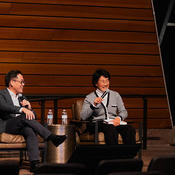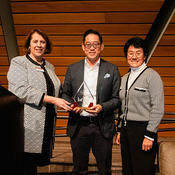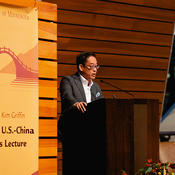Brian Wong became the first American to join Alibaba Group, a Chinese technology company that is now one of the most valuable corporations in the world, in 1999. In the 2023 Bob and Kim Griffin Building U.S.-China Bridges Lecture, Wong offered his insights into how Chinese management philosophy and cultural practices can enhance our understanding of the U.S.-China relationship.
Wong highlighted how Alibaba founder Jack Ma was inspired by American ideals, including the work ethic he saw in Silicon Valley, but he also applied Eastern thought to how he managed the company.
“Jack used to say that we want to use a charitable heart to create a company, but to use business tactics to operate it,” Wong said. “He said we want to use Western management principles, but we want to use a Chinese philosophy.”
Wong introduced the concept of tao and what it means for Alibaba. He explained that the idea of tao involves harmony and interconnectedness. At Alibaba, that meant thinking of the company as an ecosystem, but also thinking about it in reference to the larger domestic market and global environment.
Tao is also the idea of a path or a natural direction in the universe. This translated into Alibaba’s mission to make it easy to do business anywhere.
“We were trying to support those who are underserved, using technology as a way to help them achieve success and opportunities,” Wong said. “We thought we were the heroes helping the small businesses fight against the big guys….That was how we defined our path in everyday terms, and it gave us our reason for being.”
The unity of contradictions is another piece of tao.
“Alibaba is a company that was really built off this constant change or movement between opposite concepts: big and small, charity versus business, dreams and reality, East and West,” Wong said. “Keeping both of these concepts in mind…allowed us to be flexible while staying focused on a path or a goal in the long term.”
But what does tao mean for U.S.-China relations? Wong argued that we need to define our purpose.
“What are we trying to achieve as a nation, as people of a country?” he asked. “I think it’s safe to say that what we really aspire to is to pursue a good and fulfilling life….Sometimes I wonder why the two countries are fighting when we have some much more significant existential issues at stake.”
Wong highlighted some of those existential threats facing society today, from climate change and public health to wealth disparity and cybersecurity. He argued the two countries have a shared responsibility to address these issues. For example, the U.S. and China are the largest producers of carbon emissions in the world. At the same time, they are the largest investors in renewable energy.
Tao can also help us understand that the U.S.-China relationship is dynamic, according to Wong.
“There’s going to be days where it feels like China is being the aggressor, and there are times when it feels like America is going to be becoming the aggressor,” Wong said. “This is a constant dynamic state of change and opposition of yin yang. We have to accept that, but also think about how the decisions we make impact that dynamic state at play.”
The concept of unity of contradictions is applicable to U.S.-China relations, as well, Wong said.
“What we need to recognize is this importance of interdependence, or what I call mutual transformation,” Wong explained. “The fact is that the United States and China need one another to exist. We should probably use this relationship in a constructive way to say, ‘what can we learn from what the other one is doing better than us?’”
Wong concluded by acknowledging that governments can be fallible, and people-to-people connection can help ease tensions between China and the U.S.
“I think the best thing we can do for ourselves as individuals is to maintain the links of connectivity between the two countries, the two cultures, and provide a floor and foundation for this relationship to develop,” Wong said.
Harvey Charles, the University of Minnesota’s vice provost for international programs and senior international officer, echoed Wong’s message.
“This event could not have come at a more critical time, when we are currently witnessing in real time what happens when nations and groups of people fail to create harmonious relationships,” said Harvey Charles, the University of Minnesota’s vice provost for international programs and senior international officer. “Higher education, and particularly the China Center, has a crucial role to play in fostering greater understanding and more harmonious relationships between and among nations.”



